2015 Target For A Strong Climate Treaty
Air Date: Week of January 23, 2015

The world prepares to strike a comprehensive agreement on climate at the UN Climate Convention summit in Paris later this year. (Photo: Moyan Brenn; Flickr CC BY-ND 2.0)
2015 is a vital year for international climate negotiators. Jennifer Morgan, Global Director of the Climate Program at the World Resources Institute, discusses the reasons and the difficulties with host Steve Curwood, in light of last year’s Lima Climate Talks, and the need to agree to a strong new treaty at the Paris summit in December.
Transcript
CURWOOD: From the Jennifer and Ted Stanley Studios in Boston and PRI, this is Living on Earth. I’m Steve Curwood. Since the turn of the century we’ve seen fourteen of the hottest years on record, with 2014 registering as the hottest yet. As global warming progresses, more and more political and economic institutions are taking notice, including this year’s world financial summit in Davos, Switzerland. And while many are talking about climate disruption, the one international institution charged with doing something about it is the UN Climate Convention, which has set a summit session in Paris this December as the moment for all nations to agree on a meaningful new climate treaty. Jennifer Morgan, global director of the climate program at the World Resources Institute explains.
MORGAN: This a big year for the climate. By the end of the year all countries need to agree on a new treaty to reduce emissions and help the most vulnerable deal with the impacts, and part of that is for all countries by March to put on the table what they're going to do at home to reduce emissions.
CURWOOD: So what happened in Lima at the most recent round of negotiations?
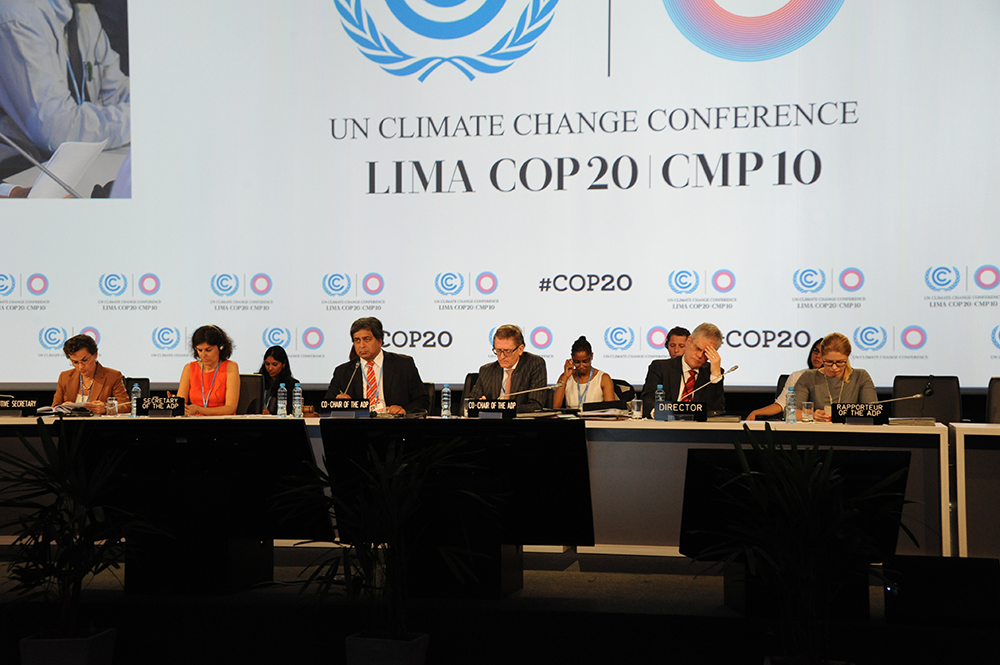
The December climate talks in Lima, Peru produced a draft negotiating text and agreements on what types of emissions data countries need to submit for their emissions reduction offers—defining a procedure for international climate cooperation. (Photo: UNclimatechange; Flickr CC BY 2.0)
MORGAN: There were a couple of important steps that were achieved in Lima. First of all, they agreed on a draft negotiating text so they can really get started right away at the next session in February. They agreed on what kind of information countries have to use when they table their offers - so they need to be clear this time about what sectors and gases, what assumptions - and they also agreed that all countries needed to put forward that information. So, there's new coalitions emerging between developing and developed countries. It's not this old north-south debate as much anymore.
CURWOOD: Talk to me about these new coalitions, and talk to me about the fact that for the first time every nation at some level or another has to commit to some sort of reduction.
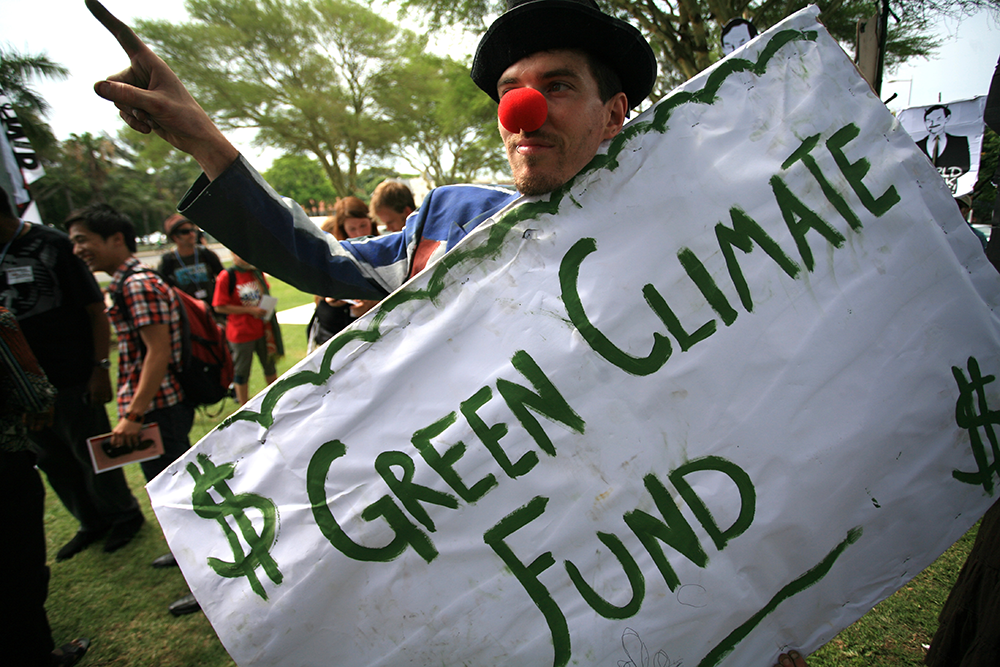
Heads-of-state offered contributions to the Green Climate Fund at the Lima talks. (Photo: Luka Tomac/Friends of the Earth International; Flickr CC BY-NC-ND 2.0)
MORGAN: Well, what you saw in the Lima meeting which I think is representative of what's happening is from Latin America, heads of state coming and announcing their actions, what they are doing, because it is in their interests, whether it be restoring degraded lands for forests, whether it be putting in place bus rapid transit because of air pollution and climate change, and they even put money on the table for the Green Climate Fund. So in the real world, they're acting; they want support but they're acting and working with the European Union and with the United States, and I think the fact that all countries are putting forward their offers for what they need to do is an important milestone. This should be truly global for the first time, so it's a new form of international cooperation which is emerging, and that is the opportunity in 2015.
CURWOOD: Why do you suppose we're seeing this now?
MORGAN: I think there's a couple of reasons. First of all, the impacts are happening. I think in the city of Lima, people there are aware of the fact that their glaciers are melting and that has an impact on their water supply. People in Africa understand food security so the impacts are much more prevalent. But I think also you hear a lot about the fact that the responses are beneficial. So if you want to grow renewables, that helps both on climate but also to reduce air pollution. You want to shift away from coal, there's all kind of reasons to do that, so I think countries are connecting the dots, they're being smart about their cost-benefit analysis.
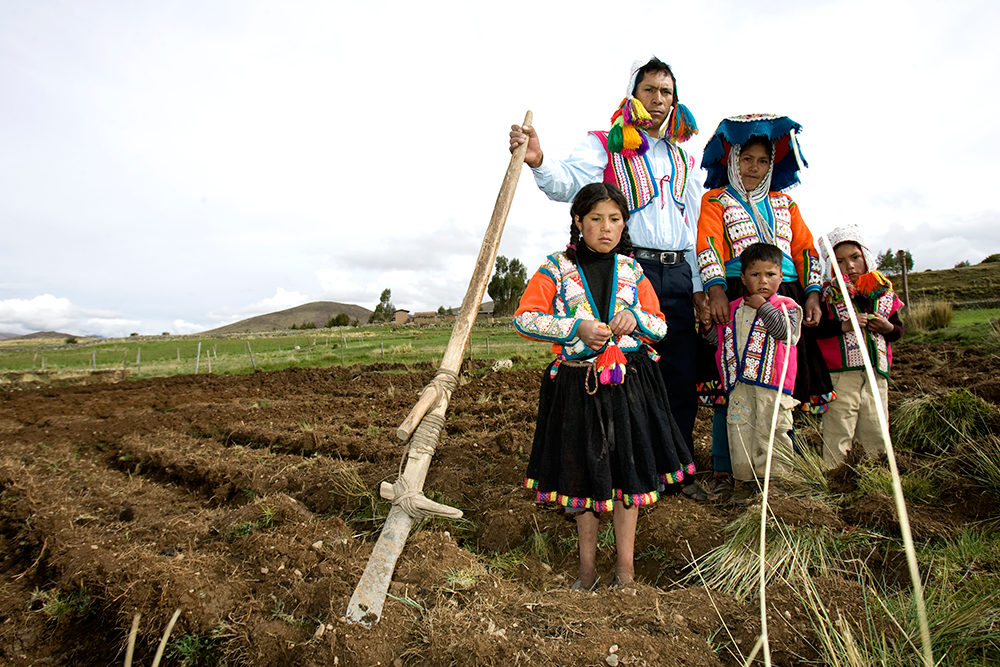
“In the city of Lima, people there were aware of the fact that their glaciers are melting, and that has an effect on their water supply,” Morgan says. Climate change threatens the livelihoods of Peruvian farmers like Cayetano, shown here with his family, who depend on streams from natural glacial melt to water their crops. (Photo: Oxfam International; Flickr CC BY-NC-ND 2.0)
CURWOOD: Now, where does the Lima accord fall short, do you think?
MORGAN: It falls short in that countries will put forth their offers to the world, but they will not have to come in front of the United Nations to say what they're doing and answer questions about it. That was blocked in the final hours of the Lima meeting, and is now something that will require civil society and business and others to be more engaged because that official platform was not created.
CURWOOD: Now, one of the phrases that came out of this is "common but differentiated responsibility". What does that mean, both legalistically but in intent as well?
MORGAN: Well, "common" I think is that every country needs to act, and that's agreed. "Differentiated" is that countries are different in their capacities domestically, whether they are poorer or richer means whether they're able to respond, whether they have a lot of renewable resources or a lot of coal has a big impact. The other piece that's in there is “responsibilities” and there are many countries like India that have focused on historical responsibility. It certainly is a fact that developed countries have been emitting a lot longer than developing countries and therefore, some see that they should be held historically responsible for those emissions.
CURWOOD: You said that the traditional north-south tension seems to have changed, that there are different alliances now. What do you mean?
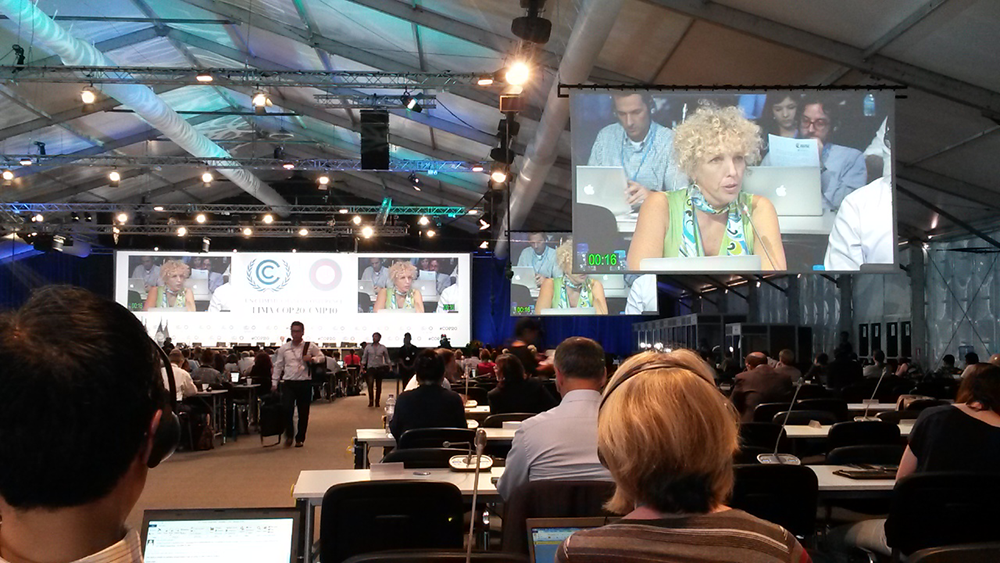
Morgan spoke during the Lima Climate Action High Level Meeting at COP 20, highlighting the importance of connecting UN negotiations with citizen actions already taking place around the globe. (Photo: Rhys Gerholdt/World Resources Institute; Flickr CC BY-NC-SA 2.0)
MORGAN: Well, I think the first thing that occurred was the US-China announcement going into that Lima meeting which was quite historic just because of those two coming together, and China positioning itself with the United States instead of developing countries. It stated it has continued cooperation with those countries, but that was the first kind of major shift I think. You then saw developing countries both funding other developing countries through contributions in the Green Climate Fund and their intent to act unilaterally. And so, the conversation is what more they can do with support from developed countries rather than not doing anything unless developed countries provide support. It's fair to say that the poorest countries though, they still will need support, no matter what. So there, there's still a north-south question but as a whole it's much more diverse and dynamic, I think, and complex than it was before.
CURWOOD: Give me a couple of examples of developing countries that are helping other developing countries.
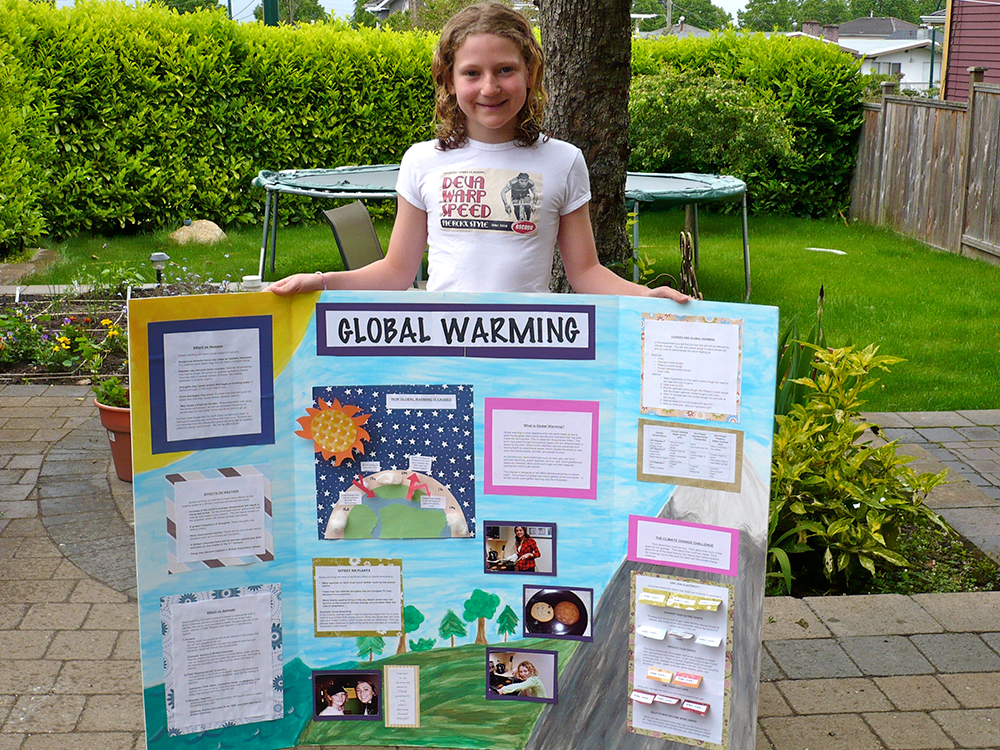
Negotiators at Lima’s COP 20 emphasized the importance of climate education. (Photo: ttcopley; Flickr CC BY-NC-SA 2.0)
MORGAN: So you have the Mexicans, Chileans and the Peruvians coming forward during the Lima conference and putting funds into the Green Climate Fund which has been established to support the poorer developing countries to act, either to adapt to the impacts or to reduce emissions. You also have the Chinese actually creating their own fund with $100 million also for "south-south" collaboration. Unclear whether that would come in the agreement or not but there's a lot happening there. You have Brazil working with African countries often about biofuels where they have an advancement in technologies and having created an adaptation fund to support the poorest countries. So a number of places around the world is increasing that developing country to developing country support.
CURWOOD: One of things that seems new to me out of these negotiations was this call for schools to teach students around the world about climate change.
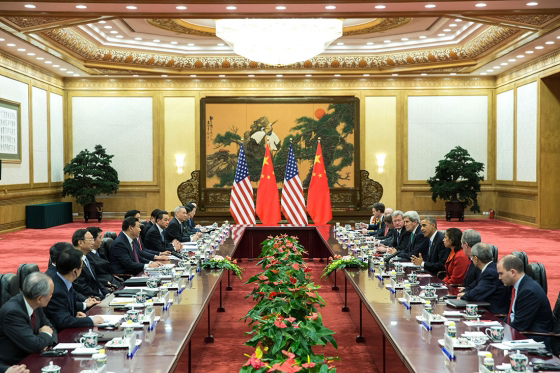
Morgan points to the climate agreement made by President Obama and China’s President Xi, which came just before Lima’s COP 20, as a message that China now has the resources and drive to help mitigate climate change. (Photo: Chuck Kennedy/Official White House Photo)
MORGAN: Yes, very interesting. I mean, there's always been this requirement in the climate convention to actually be doing education and awareness raising but I think the importance of engaging more and more voices in this debate came forward. So there is this new element to try and get climate change in curricula so that there can be more engagement in the national climate change strategies, national development strategies - a really important, on and off forgotten piece of the puzzle.
CURWOOD: So what happens this year? I understand there will be a summit in Paris.
MORGAN: By the end of year, all countries should hopefully support a new binding legal instrument to reduce greenhouse gases that they all participate in, and also an agreement that provides support for the most countries around the world and sends a clear signal that this is a turning point, that the future is going to be about low-carbon prosperity and that businesses and investors start accelerating the pace of change to solve the problem.
CURWOOD: So what needs to happen in order to get such an agreement by the end of this year? How well is the UN on track to achieve that?
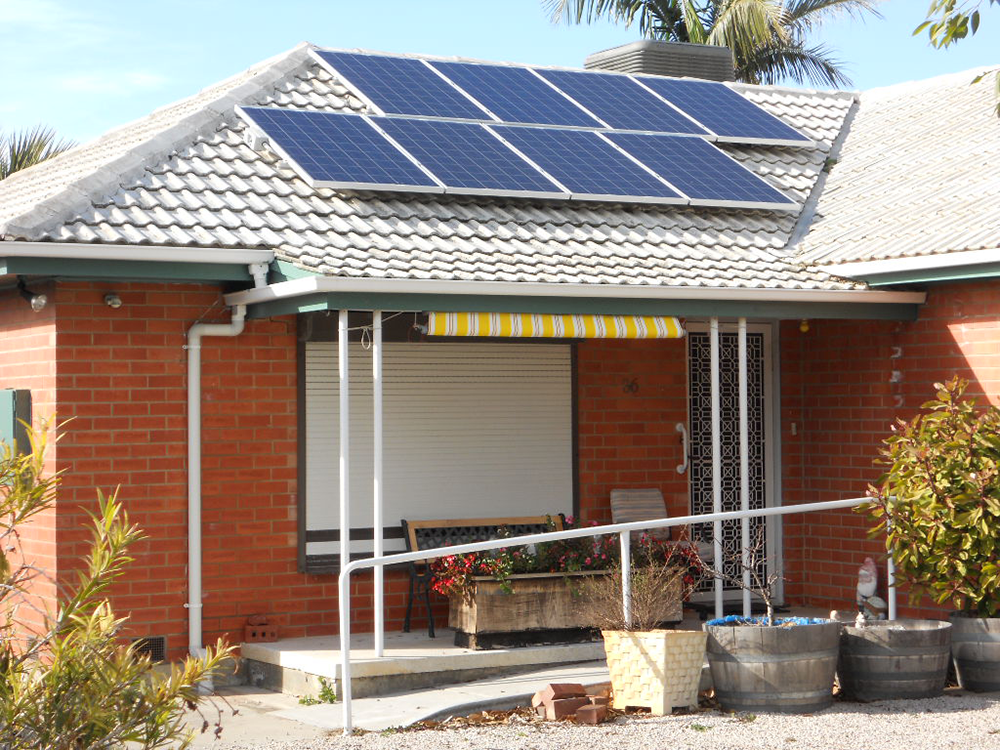
According to Morgan, the progress made at the Lima climate talks is an indication that countries realize the added benefits that climate policies have on health and societal issues, such as those that encourage renewable energy development. For example, installing solar panels can alleviate air pollution as well as reduce greenhouse gas emissions. (Photo: Michael Coghlan; Flickr CC BY-NC-SA 2.0)
MORGAN: Well, procedurally the UN is on pretty good track to achieve that. There's a negotiating session in February, there's another one in June, probably one in October where they come together and they actually talk about that draft negotiating text, but what really needs to happen is at the higher levels. So Secretary John Kerry came to Lima and gave a speech about the need for this agreement to happen in Paris. Hopefully, he will stay engaged and have the time to engage his counterparts - foreign policy ministers and heads of state. President Obama needs to stay engaged with other countries at that level. Because if you just leave it to climate negotiators, they often don't have the mandate to even make these type of big decisions. One of the big things that needs to happen is that type of engagement from all around the world - African leaders, European leaders, having a constant conversation for the next, well, 11, 12 months.
CURWOOD: In the climate negotiation business there can be a lot of fingerpointing, which do you think are important and which do you think are less helpful in this process?
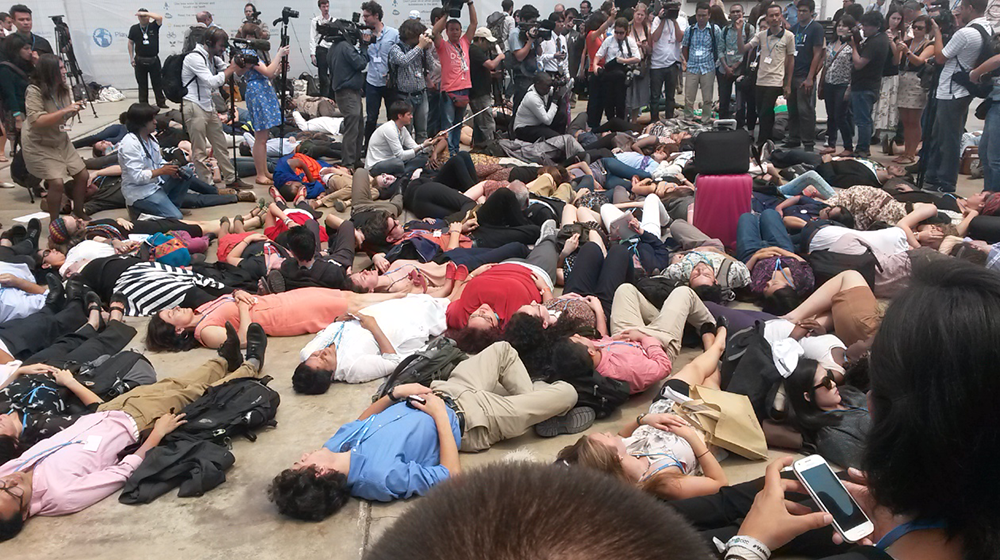
As the climate talks in Lima drew to a close, activists from all over the world staged a mass “lie-in” to refocus attention on the “forgotten voices” of those most affected by climate change. (Photo: Rhys Gerholdt/World Resources Institute; Flickr CC BY-NC-SA 2.0)
MORGAN: I think it's quite important on the country level that those that do not come forward with any kind of offer or that come forward with a weak offer, particularly other developed countries, that they're questioned about that, that it becomes an issue in the global discourse. I think that's one of the few ways of trying to exert pressure on those countries. And I just expect the attention on the fossil fuel industry with the focus on coal but also on oil to grow. The divestment campaigns that are occuring, the focus on stranded assets for investment and new coal-fired power plants, I think that will just keep going, and I think that's a very important part of the discussion that needs to happen next year. Countries should not be putting forward offers that build out coal big-time in the future. They need to be making that shift and listening to the lower carbon interests that want to move more quickly.
CURWOOD: What do you see as the biggest signs of hope for 2015 in the climate?
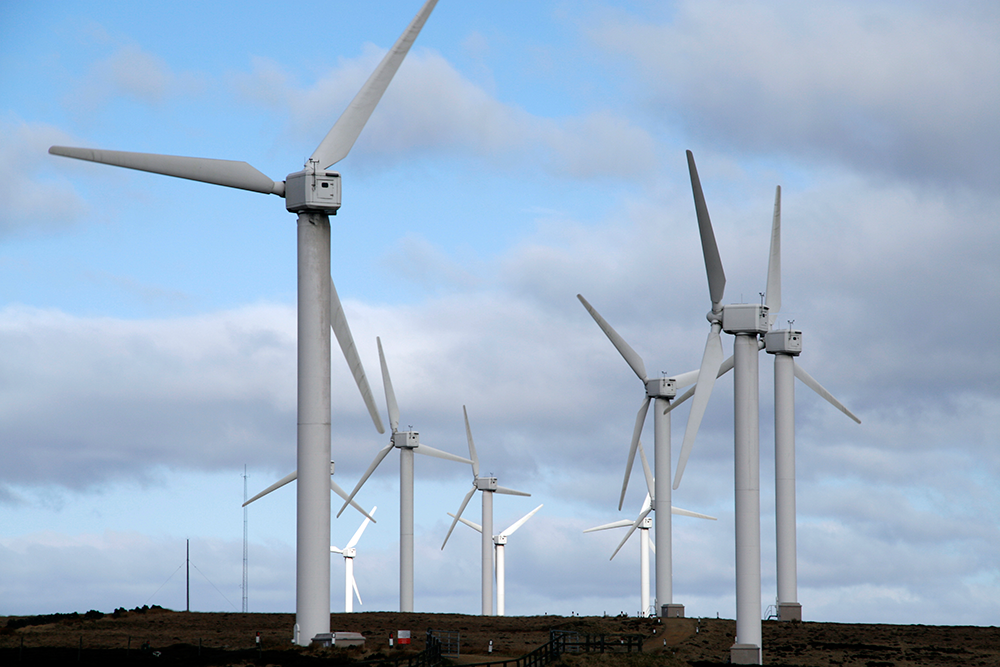
Morgan sees the dropping cost of renewable energy as a sign of hope for global mitigation of climate change. (Photo: K Ali; Flickr CC BY-NC-SA 2.0)
MORGAN: I think the biggest signs of hope are the dropping cost of renewable energy and solar and it just becoming much more normal and regular for people around the world to be having their homes powered by renewable energy. I think the growing solidarity between some developed and some developing countries about working together to solve the problem, I think it's probably the biggest sign of hope I've seen on a global level. If we can move away from polarization of "he said she said, you're to blame, we're to blame" and find ways of working together that take care of the poorest but move forward in a collective fashion I think we have a chance for a turning point.
CURWOOD: Jennifer Morgan is Global Director of the Climate Program at the World Resources Institute. Thanks for taking time with us today.
MORGAN: Thanks so much for having me Steve.
Links
UN: setting the stage for an agreement in Paris
World Resources Institute Climate Program
Living on Earth wants to hear from you!
Living on Earth
62 Calef Highway, Suite 212
Lee, NH 03861
Telephone: 617-287-4121
E-mail: comments@loe.org
Newsletter [Click here]
Donate to Living on Earth!
Living on Earth is an independent media program and relies entirely on contributions from listeners and institutions supporting public service. Please donate now to preserve an independent environmental voice.
NewsletterLiving on Earth offers a weekly delivery of the show's rundown to your mailbox. Sign up for our newsletter today!
 Sailors For The Sea: Be the change you want to sea.
Sailors For The Sea: Be the change you want to sea.
 The Grantham Foundation for the Protection of the Environment: Committed to protecting and improving the health of the global environment.
The Grantham Foundation for the Protection of the Environment: Committed to protecting and improving the health of the global environment.
 Contribute to Living on Earth and receive, as our gift to you, an archival print of one of Mark Seth Lender's extraordinary wildlife photographs. Follow the link to see Mark's current collection of photographs.
Contribute to Living on Earth and receive, as our gift to you, an archival print of one of Mark Seth Lender's extraordinary wildlife photographs. Follow the link to see Mark's current collection of photographs.
 Buy a signed copy of Mark Seth Lender's book Smeagull the Seagull & support Living on Earth
Buy a signed copy of Mark Seth Lender's book Smeagull the Seagull & support Living on Earth

